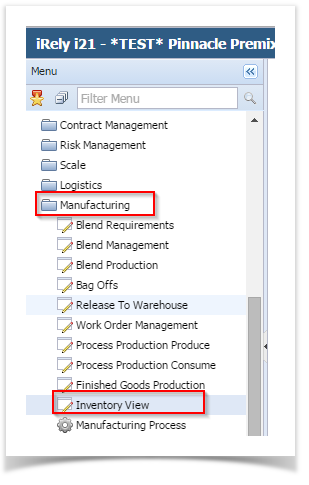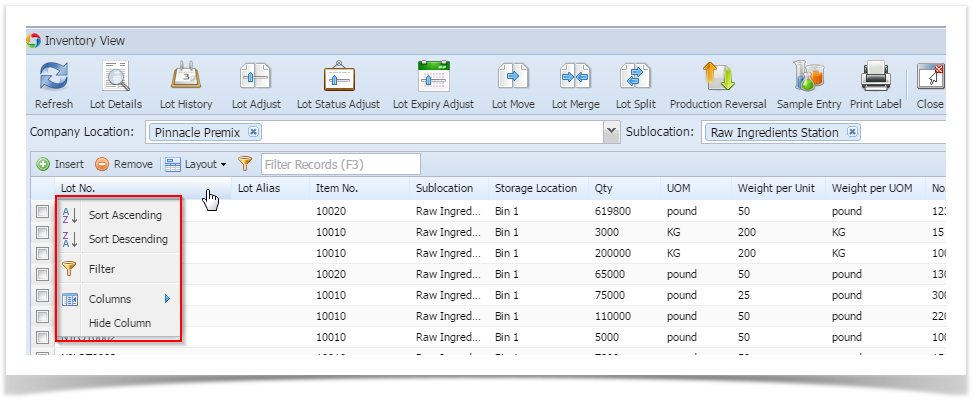Inventory View module is very helpful looking at the inventory and the historical transaction against the lot. All information regarding the lot can be viewed in this screen. This view has various options to perform different transactions on the lot/ticket available in the logged in factory.
The inventory view screen can be accessed by clicking on "Inventory View" under "Manufacturing" as shown below:
When Warehouse is enabled, the SKU and Container for a Lot will be displayed in an expandable grid, as shown below:
The following columns are available under the SKU grid.
Columns | Description |
|---|---|
Container ID | Displays the Container ID |
SKU ID | Displays the SKU ID |
SKU Status | Displays the Status of the SKU |
Quantity | Displays the Quantity available in the SKU |
Quantity UOM | Displays the Quantity UOM |
Location Name | Displays the Location Name |
Unit Name | Displays the Unit Name where SKU is available |
Factory Name | Displays the Factory Name |
Inventory View Data Display Summary:
- There will be one record for every lot-location combination.
For example, if a lot is stored in 2 different locations physically with partial quantity, there will be 2 records with the same lot Id.
Each record will have the following information
Sl#
Group
Column
Description
1
Lot Detail
LotID #
2
Expiry Date
3
Lot Status
4
Lot Alias
•Raw Tea: Tracking number (Ex.: RT number, TTI number)
•Blend, FG: Work Order by which the lot was created
5
Parent Lot ID
6
Child Count
Lots available within the parent lot
7
Lot Primary Status Code
8
Create Date
9
Created By
10
Material
Material Name
11
Description
12
Material Type
13
Owner
Owner as assigned in material configuration UDA
14
Customer
Customer as assigned in material configuration UDA
15
Cases Per Pallet
Cases Per Pallet as assigned in material configuration UDA
16
Quantity
Primary Quantity
17
UOM
18
Number of Bags
19
Weight Per Unit
20
Weight Per Unit UOM
21
Queued Quantity
Initially it will be equal to Primary Quantity and will be reduced as used in production
22
Location
Location Name
23
Location Group
24
Warehouse
25
Factory Name
26
Purchase detail
Vendor ID
Vendor ID as entered in receipt ("Received From")
27
Vendor Lot Num
Supplier Lot Number as entered in receipt
28
Garden Name
As entered in receipt (as "Remarks)
29
Price Per Unit
As received from ERP as part of PO
30
Container #
Receive Container #
31
Receipt Note
Note as entered in receipt
32
Manufacturing detail
Manufactured Date
33
Production Line Name
34
iRely - Internal
Pallets
35
Due Date
36
Start Quantity
37
Report Path App Setting
38
Representing Qty
39
Date
40
Short Desc
41
Customer Specific
CAD #
Not Applicable
42
CAD WT
Not Applicable
43
Contract #
Not Applicable
44
Container Type
Not Applicable
45
Storage Container
Not Applicable
Features Summary:
Inventory View has the following features as shown in the above image:
- Refresh View
Using this feature, the user will be able to view the data records based on the following selection criteria
a) Single or multiple factories selection
b) Single or multiple warehouses selection within the selected factory/factories
c) The filter criteria column should show all the columns in the list
d) Show Historical Lots as toggle to display or filter the historical lots
e) Clicking on "Refresh List" button will display the records based on the selection criteria as mentioned above - Search Criteria
This section will be useful for the user to define multiple search criteria with different fields which will be applied while displaying the inventory data records. The selection criteria can be saved with the name so that it can be retrieved later - Lot level operations
The options available in "Lot level operations" will be useful to perform unique operations on the selected lot - General Features
General features cover the features that are more generic like Inventory View GUI related features. - Grid features
User should be able to sort records and select columns based on the requirement. - Show historic lots
Application will not load the records where the lot quantity is 0 by default. These are called historical lots. User can see these lots by selecting the 'Show Historical' check box.



